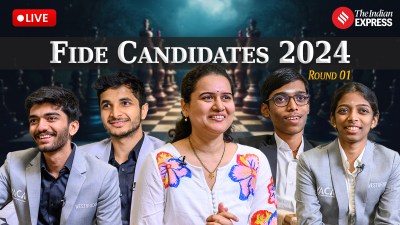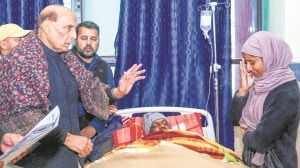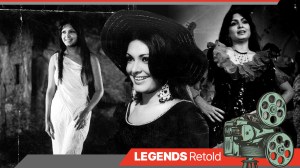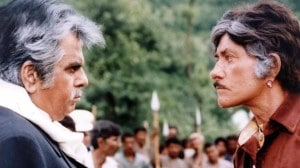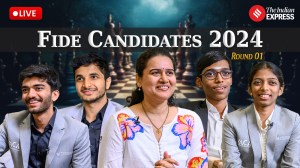- India
- International
The women who wrote the Constitution of India
Among the 299-member Constituent Assembly, there were 15 women who advocated passionately for a kind of India that would bear the imprint of both genders. They argued ardently over a range of topics from reservations to the Uniform Civil Code.
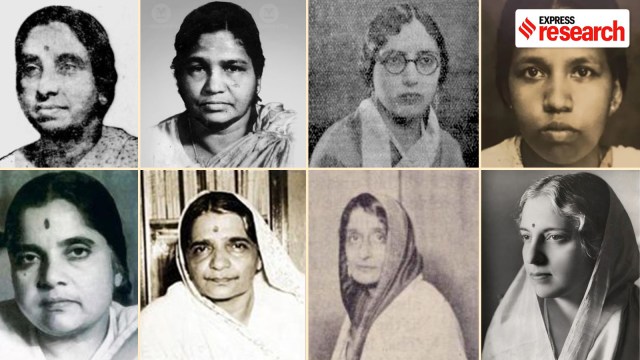 Clockwise Ammu Swaminathan, Annie Mascarane, Begum Aizaz Rasul, Dakshayani Velyuthan, Vijay Lakshmi Pandit, Rajkumari Amrit Kaur, Hansa Jivraj Mehta and Durgabai Deshmukh (Edited by Abhishek Mitra)
Clockwise Ammu Swaminathan, Annie Mascarane, Begum Aizaz Rasul, Dakshayani Velyuthan, Vijay Lakshmi Pandit, Rajkumari Amrit Kaur, Hansa Jivraj Mehta and Durgabai Deshmukh (Edited by Abhishek Mitra) Even after seven decades of Independence, the gendered writing of our history and popular narratives present only men as the architects of our Constitution. However, the 299-member Constituent Assembly had a bright set of 15 women who came from diverse backgrounds and endured patriarchy, caste oppression, child marriage and widowhood.
These experiences informed their discussions, arguments and positions on subjects like reservations, minority rights and legislative finances. During the debate around the Hindu Code Bill, members like Durgabai Deshmukh and Hansa Kumari made strong arguments for a Uniform Civil Code, which they believed would ensure more equality for women.
Dakshayani Velayudhan and Begum Aziaz Rasul argued against reservations and separate electorates for Scheduled Castes and Scheduled Tribes. They believed that reservations would maintain an unbridgeable gap between minorities and the majority.
These women advocated for a kind of India that would bear that imprint of both men and women. Economic, social and political equality for everyone in society was their foremost goal. Despite being on the receiving end of distasteful comments from several Constituency Assembly members, these women spoke their minds and played a crucial role in scripting the sovereign and secular republic of India.
Annie Mascarene
Born in 1902, Annie Mascarene’s work as a lawyer and politician in Travancore influenced her arguments in the Constituent Assembly Debates greatly. She fought to integrate the princely state of Travancore into the newly independent India and became the first woman to hold a ministerial and legislative assembly position in Travancore.

Mascarene in the Constituent Assembly Debates firmly believed in the centralisation of power for a smooth functioning of a democracy. She also warned against complete centralisation which would negatively affect the nature of democratic institutions. She said that the task of the Assembly was to lay down the rudimentary principles of democracy for generations to come and not just for the near future.
Hansa Jivraj Mehta
As a staunch freedom fighter, women’s rights activist and member of the Constituent Assembly, Hansa Jivraj Mehta essayed several roles. On August 15, 1947 as the country celebrated its Independence and President Rajendra Prasad took the pledge of freedom, Mehta presented the country’s first national flag on behalf of the women of India.
Mehta remained committed to women’s issues throughout her life and, in the Constituent Assembly, made strong arguments against reservations for women. “What we have asked for is social justice, economic justice and political justice, not reserved seats for quotas and separate electorates,” she said. Mehta also served on the board of UNESCO and became the first Vice Chancellor of MS University in Baroda.
Dakshayani Velayudhan
Born into the Pulaya community of Kerala, Dakshayani Velayudhan faced acute discrimination from the upper caste communities in Cochin and Travancore. Movements against caste discrimination were becoming prominent.
Velayudhan affirmed that the Constituent Assembly does not just “provide a new framework for the country but also grants the people a new framework of life”. She was a Gandhian and opposed untouchability. She supported Article 17 of the Constitution which abolishes untouchability. Velayudhan did not pursue electoral politics but was actively involved in social work in Delhi.
Amrit Kaur
A princess by birth but a fierce activist by passion, Amrit Kaur played an important role both during the freedom struggle and in shaping independent India. Kaur joined Gandhi in the Civil Disobedience movement in 1930 and was passionate about the political participation of women.
Like many of her contemporaries, Kaur advocated for universal adult franchise and did not believe in reservations for women. Kaur believed that true equality would only be gained when women made it to the legislature through ordinary elections rather than through reservations.
She advocated for the Uniform Civil Code along with Hansa Mehta and wanted to replace “free practice of religion” with “freedom of religious worship” in the draft Constitution. A secular at heart, Kaur carried with her a spinning wheel, the Bhagwad Gita and the Bible when she was jailed after the Quit India Movement.
Kaur also served as the first women Health Minister and founded renowned institutions like the All India Institute of Medical Sciences (AIIMS).
Ammu Swaminathan
Fearless and politically charged, Ammu Swaminathan was a social worker, politician and anti-caste activist. Despite being born into an upper caste family, Swaminathan actively fought to erase caste-based discrimination in India.
Swaminathan started becoming politically involved in 1917 when she formed the Women’s India Association along with Annie Besant to address the social and economic problems of women workers. In the Constituent Assembly, Swaminathan supported the adult franchise and the removal of untouchability.
Having been at the receiving end of the practice of child marriage herself, she advocated for the Child Marriage Restraint Act and Age of Consent Act and the various Hindu Code Bills that pushed for reform in Hindu religious laws.
Durgabai Deshmukh
Remembered as the ‘Mother of Social Work’, Durgabai Deshmukh was one of the drivers of rigorous nation-building and social reform. Born in 1909 in Andhra Pradesh, Deshmukh did not come from a family of privilege. Since her childhood, she noticed cruel customs and poor treatment of women. When she was jailed during the Salt Satyagraha, Deshmukh observed that several women were imprisoned for crimes they did not even commit.
After this, Deshmukh decided to become a lawyer and pioneered the Andhra Mahila Sabha in 1937, which became an institution of education and social welfare. In the Constituent Assembly, she weighed in on judicial matters and advocated lowering the age from 35 to 30 to hold a seat in the Council of Ministers.
After Independence, she also served in the Planning Commission as a leader of social services and became the chairperson of the Central Social Welfare Board (CSWB).
Begum Aizaz Rasul
“Reservation is a self-destructive weapon which separates the minorities from the majority for all time,” said Begum Aizaz Rasul in the Constituent Assembly in 1948. Rasul was born into a princely family in Punjab and was introduced to politics early on.
She was the only Muslim woman member in the Constituent Assembly and advocated for minority rights in a secular state. However, she opposed reservations and separate electorates on communal lines. Beyond the Constituent Assembly, Rasul in the 1990s also believed that given the rising popularity of Hindutva, “it is time to think anew of how to improve the educational and socio-economic conditions of Muslims”.
Rasul was also the President of the Indian Women’s Hockey Federation and established the All India Women’s Hockey Association for 20 years.
Vijaya Laxmi Pandit
Often sidelined as Jawaharlal Nehru’s sister, Vijaya Laxmi Pandit was a diplomat and revolutionary. Born into one of the most illustrious families in India, Vijaya Laxmi Pandit was the first woman cabinet minister in the British era. She was also one of the first leaders to call for an Indian constituent assembly to frame a Constitution.
In the Assembly, Pandit emphasised the responsibilities of a free India towards its citizens and other countries. After independence, Pandit became the face of India on a global stage. She was the only woman delegate at the United Nations Organisation Conference. She was also the first woman President of the UN General Assembly in 1953.
Apr 05: Latest News
- 01
- 02
- 03
- 04
- 05


